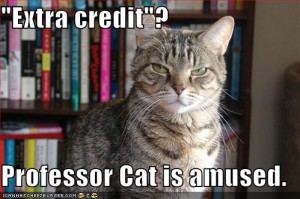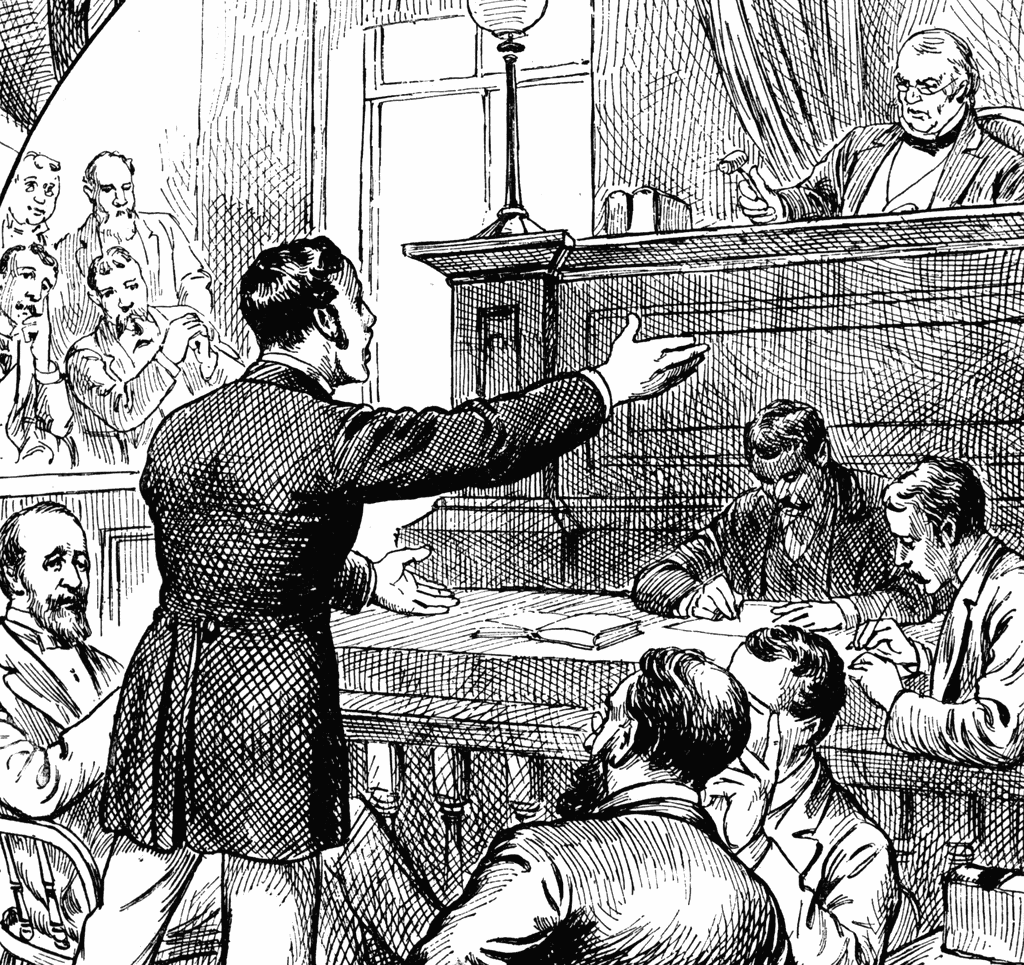This post contains a case summary for
Katz v. United States. This is the same material I gave you in class.
All text is from
http://www.acslaw.org/.
Charles Katz, Petitioner
v.
United States
Supreme Court of the United States
Argued October 17, 1967
Decided December 18, 1967
MR. JUSTICE STEWART delivered the opinion of the Court.
The petitioner was convicted in the District Court for the Southern District of California under an eight-count indictment charging him with transmitting wagering information by telephone from Los Angeles to Miami and Boston in violation of a federal statute. At trial the Government was permitted, over the petitioner’s objection, to introduce evidence of the petitioner’s end of telephone conversations, overheard by FBI agents who had attached an electronic listening and recording device to the outside of the public telephone booth from which he had placed his calls.
[T]he Fourth Amendment protects people, not places. What a person knowingly exposes to the public, even in his own home or office, is not a subject of Fourth Amendment protection. … But what he seeks to preserve as private, even in an area accessible to the public, may be constitutionally protected.
The Government stresses the fact that the telephone booth from which the petitioner made his calls was constructed partly of glass, so that he was as visible after he entered it as he would have been if he had remained outside. But what he sought to exclude when he entered the booth was not the intruding eye-it was the uninvited ear. He did not shed his right to do so simply because he made his calls from a place where he might be seen. No less than an individual in a business office, in a friend’s apartment, or in a taxicab, a person in a telephone booth may rely upon the protection of the Fourth Amendment. One who occupies it, shuts the door behind him, and pays the toll that permits him to place a call is surely entitled to assume that the words he utters into the mouthpiece will not be broadcast to the world. To read the Constitution more narrowly is to ignore the vital role that the public telephone has come to play in private communication.
…The question remaining for decision, then, is whether the search and seizure conducted in this case complied with constitutional standards. In that regard, the Government’s position is that its agents acted in an entirely defensible manner: They did not begin their electronic surveillance until investigation of the petitioner’s activities had established a strong probability that he was using the telephone in question to transmit gambling information to persons in other States, in violation of federal law. Moreover, the surveillance was limited, both in scope and in duration, to the specific purpose of establishing the contents of the petitioner’s unlawful telephonic communications. The agents confined their surveillance to the brief periods during which he used the telephone booth, and they took great care to overhear only the conversations of the petitioner himself.
Accepting this account of the Government’s actions as accurate, it is clear that this surveillance was so narrowly circumscribed that a duly authorized magistrate, properly notified of the need for such
investigation, specifically informed of the basis on which it was to proceed, and clearly apprised of the precise intrusion it would entail, could constitutionally have authorized, with appropriate safeguards, very limited search and seizure that the Government asserts in fact took place.
…It is apparent that the agents in this case acted with restraint. Yet the inescapable fact is that this
restraint was imposed by the agents themselves, not by a judicial officer. They were not required, before commencing the search, to present their estimate of probable cause for detached scrutiny by a neutral magistrate. They were not compelled, during the conduct of the search itself, to observe precise limits established in advance by a specific court order. Nor were they directed, after the search had been completed, to notify the authorizing magistrate in detail of all that had been seized. In the absence of such safeguards, this Court has never sustained a search upon the sole ground that officers reasonably expected to find evidence of a particular crime and voluntarily confined their activities to the least intrusive means consistent with that end. Searches conducted without warrants have been held unlawful ‘notwithstanding facts unquestionably showing probable cause,… for the Constitution requires ‘that the deliberate, impartial judgment of a judicial officer be interposed between the citizen and the police … ‘Over and again this Court has emphasized that the mandate of the (Fourth) Amendment requires adherence to judicial processes,’ … and that searches conducted outside the judicial process, without prior approval by judge or magistrate, are per se unreasonable under the Fourth Amendment subject only to a few specifically established and well-delineated exceptions.
The Government does not question these basic principles. Rather, it urges the creation of a new exception to cover this case. It argues that surveillance of a telephone booth should be exempted from the usual requirement of advance authorization by a magistrate upon a showing of probable cause. We cannot agree. Omission of such authorization … ‘bypasses the safeguards provided by an objective predetermination of probable cause, and substitutes instead the far less reliable procedure of an after-the-event justification for the … search, too likely to be subtly influenced by the familiar shortcomings of hindsight judgment.’ And bypassing a neutral predetermination of the scope of a search leaves individuals secure from Fourth Amendment violations ‘only in the discretion of the police.’
These considerations do not vanish when the search in question is transferred from the setting of a home, an office, or a hotel room to that of a telephone booth. Wherever a man may be, he is entitled to know that he will remain free from unreasonable searches and seizures. The government agents here ignored ‘the procedure of antecedent justification … that is central to the Fourth Amendment, a procedure that we hold to be a constitutional precondition of the kind of electronic surveillance involved in this case. Because the surveillance here failed to meet that condition, and because it led to the petitioner’s conviction, the judgment must be reversed.
It is so ordered.
Judgment reversed.
Mr. Justice HARLAN, concurring.
I join the opinion of the Court, which I read to hold only (a) that an enclosed telephone booth is an area where, like a home, … a person has a constitutionally protected reasonable expectation of privacy; (b) that electronic as well as physical intrusion into a place that is in this sense private may constitute a violation of the Fourth Amendment; and (c) that the invasion of a constitutionally protected area by federal authorities is, as the Court has long held, presumptively unreasonable in the absence of a search warrant. …
As the Court’s opinion states, ‘the Fourth Amendment protects people, not places.’ The question, however, is what protection it affords to those people. Generally, as here, the answer to that question requires reference to a ‘place.’ My understanding of the rule that has emerged from prior decisions is that there is a twofold requirement, first that a person have exhibited an actual (subjective) expectation of privacy and, second, that the expectation be one that society is prepared to recognize as ‘reasonable.’ Thus a man’s home is, for most purposes, a place where he expects privacy, but objects, activities, or statements that he exposes to the ‘plain view’ of outsiders are not ‘protected’ because no intention to keep them to himself has been exhibited. On the other hand, conversations in the open would not be protected against being overheard, for the expectation of privacy under the circumstances would be unreasonable.
The critical fact in this case is that ‘(o)ne who occupies it, (a telephone booth) shuts the door behind him, and pays the toll that permits him to place a call is surely entitled to assume’ that his conversation is not being intercepted. The point is not that the booth is ‘accessible to the public’ at other times, … but that it is a temporarily private place whose momentary occupants’ expectations of freedom from intrusion are recognized as reasonable. …
 ...here's another one. Ms. Furey sent me an e-mail with the following request:
...here's another one. Ms. Furey sent me an e-mail with the following request:





